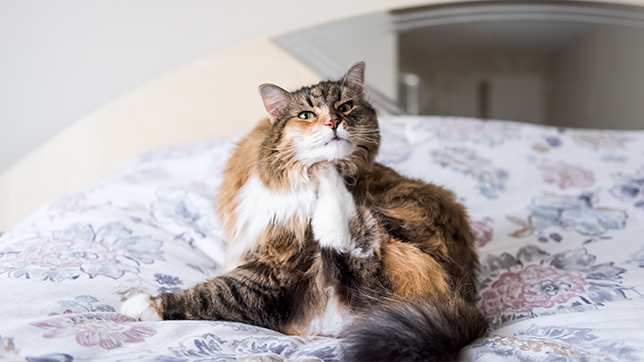13th May 2024
Can cats get hayfever?
As spring and summer finally approach, flowers begin to bloom at the sight of sunlight! Although flowers, plants, and trees that produce pollen are incredibly beautiful, the allergies caused by that pollen can be challenging for some.
Let’s explore whether cats can get hayfever and how you can support them throughout pollen allergy season…
What is hayfever?
Before we can uncover the impact of hayfever on cats, it’s helpful to understand what hayfever is and why it happens.
Hayfever is an allergic reaction to pollen, usually caused when pollen particles come into contact with the eyes, nose, mouth or throat.
If you have hayfever, your immune system will attack pollen particles by releasing a chemical called ‘histamine’ into your blood stream, which is what causes hayfever symptoms.
Despite sharing similar symptoms to a cold virus – like a runny nose and sneezing, for example – hayfever is not contagious.
Can cats get hayfever?
Yes, cats can get hayfever!
In fact, your cat’s hayfever is created in the same way as it would if you had hayfever – by their immune system reacting to pollen particles.
What are the symptoms of hayfever in cats?
There are many different symptoms that might suggest your cat has hayfever, including:
- Excessive scratching and/or overgrooming – your cat’s skin may be itchy if they have hayfever and, due to their scratching, could become inflamed.
- Bald patches – as a result of excessive scratching, your cat may have bald patches and sores; especially around their ears, backend, tail, and paws.
- Itchy, runny eyes – the irritation caused by their reaction to pollen can make your cat’s eyes watery and irritated.
- Sneezing and/or coughing – just as many humans will experience if they have hayfever.
- Snoring – an inflamed throat developed because of hayfever might cause some cats to start snoring.

How to diagnose hayfever in cats
There are currently no specific hayfever tests available for cats.
Each cat’s experience of hayfever will be unique, which means your vet is likely to begin their investigations by ruling out other causes for your cat’s symptoms.
Providing your vet can rule out all other health concerns, allergies, and skin conditions, they’ll be able diagnose your cat as having hayfever.
How to treat hayfever in cats
Treating your cat’s hayfever will depend entirely on your vet’s advice, though here are a few treatments your vet may prescribe:
- Antihistamines – are usually prescribed as a preventative treatment, to be given daily to reduce the impact of hayfever symptoms for your cat.
- Anti-allergy injections – or steroids could be given to your cat by a vet if they’re suffering badly with hayfever, to lessen the severity of your cat’s symptoms.
- Weekly bathing – to remove pollen from their coat, you may need to bathe your cat once or twice a week using vet-approved shampoo.
Always follow your vet’s advice about your cat’s hayfever treatment and please don’t give your cat hayfever medicine meant for humans.
Prevention of hayfever in cats
While it’d be impossible to entirely remove all pollen from your cat’s environment, you could take the following steps to ease your cat’s hayfever symptoms:
- Wash your hands before and after handling your cat – to reduce the risk of pollen transferring to your feline friend.
- Vacuum and dust your home more often – to keep pollen levels low.
- Frequently clean your cat’s bedding and toys – to lessen the amount of pollen in their environment.
- Gently wipe your cat’s fur with a clean, lightly damp cloth or brush them when they return from being outside – to remove as much pollen as possible from their coat.
- Keep your cat indoors when the pollen count is high – to limit their exposure to pollen.
The Met Office has a pollen forecast, which could help you determine when your cat is most likely to suffer from hayfever or pollen allergies.
You can chat to vet experts over at Joii Pet Care at any time, from the comfort of your own home, if you’re concerned about your cat’s hayfever symptoms.
Looking for more cat advice?
We’ve written some handy cat advice guides, to help you unlock the secrets of your mysterious moggy.
Need cat insurance?
Cat insurance can help cover the cost of veterinary treatment if your cat gets injured or falls ill.
